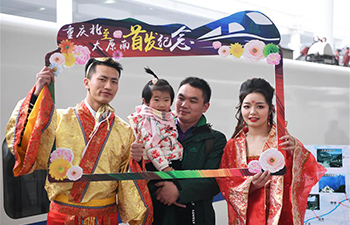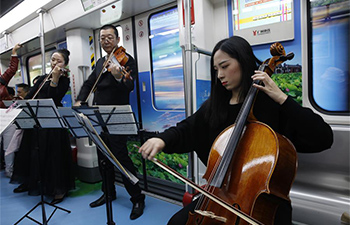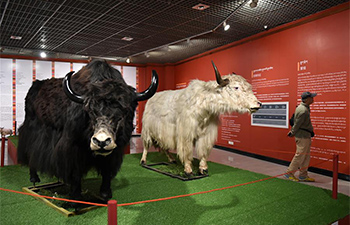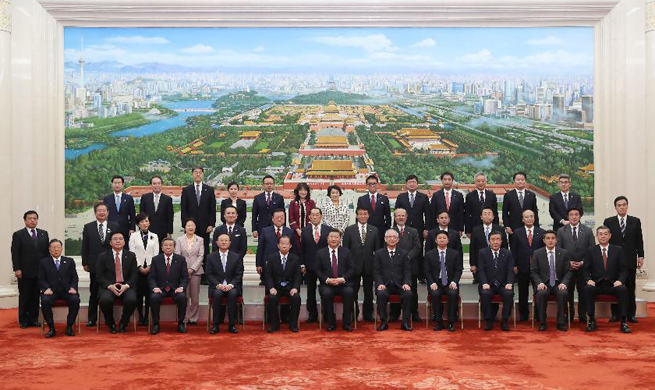JINAN, Dec. 28 (Xinhua) -- On a bitter winter afternoon, more than 100 villagers gather in a large, warm hall to listen to a lecture on Confucianism delivered by a teacher.
Using simple language, Zhang Heng, one of Qufu City's Confucian Volunteers, explains the need for virtues and how to solve trivial disputes through consultation, in pursuit of harmony.
The newly-built hall is named the "home of happiness and harmony" in Gongjia village. Qufu, in east China's Shandong Province, is the birthplace of Confucius. Such lectures are common in Qufu and many other cities in the province.
Confucius (551 B.C.-479 B.C.) set up the first private school in China and had 3,000 disciples, of whom 72 became accomplished. The teachings of Confucius center on peace and social harmony. His proverbs were collected in the "Analects" by his students.
Confucianism, which steered Chinese society for more than 2,000 years, is having a revival in China and attracting interest from around the world.
In Qufu, each of its 405 villages has a Confucianism teacher and a lecture hall for regular classes. These lectures are usually given by retired teachers or prominent figures who know Confucianism.
Students at primary and middle schools in Shandong as well as Qufu Normal University have compulsory classes on traditional values of Confucianism.
LIFE CONFUCIANISM
"With promotion of traditional virtues, disrespect for elders has almost disappeared and disputes between villagers have dropped dramatically," said Gong Jian, Communist Party chief of the village.
The few disputes there, are resolved in the village's "harmony first" mediation room, said Gong, who often interprets core key Confucian concepts such as "ren" (benevolence) and "yi" (righteousness) before villagers.
Zhang, the volunteer, said lectures enlightened villagers, most of whom no longer worry about their basic living needs, but pursue a richer life, both materially and spiritually.
Huang Yushun, deputy head of the Advanced Institute of Confucian Studies at Shandong University, put forward his theory of Confucian life in an attempt to bring the spirit of Confucianism to contemporary daily life.
The theory enables the traditional philosophy to keep pace with the realities of society, he said.
In Shandong, nearly 10,000 villages have set up halls for learning about Confucianism.
UNIVERSAL VALUE
Confucianism has global value. "Some basic tenets, such as benevolence and righteousness, remain universal, while some ideas have been discarded," said Huang.
Oei Kiem Ma, a Chinese Indonesian who majors in Chinese philosophy at Shandong University, is a follower of Confucianism.
People with a sense of egoism and superiority would disturb others if there was no code of conduct for mankind, said Oei.
She cited the Confucius principle that "Do not do to others what you would not want others to do to you."
"Such a doctrine will never be outdated," she said. "Confucianism is about life and requires practice."
In Indonesia, Confucianism has been recognized and is followed by many people, she added.
"Confucian doctrines concern human nature, and human nature is the same the world over. Confucianism has a universal appeal. It is for us to make use of it," said Alan Chan, 85, a Singaporean businessman who now devotes himself to promoting Confucianism.
"Many things in Confucianism are outdated or inappropriate, but it still has a lot of wisdom," said Chan, a descendant of Chinese philosopher Zengzi, a disciple of Confucius.
Having published his own English translation of part of the Analects of Confucius, Chan funded the construction of a Confucius Neo-Institute in Qufu, in 2013.
The Analects reflect Confucius's political views, moral principles and educational ideas. "How happy we are to have friends from afar" and "Do not do to others what you would not want others to do to you" are among the classic sayings.
The World Confucian Conference or the Nishan Forum on World Civilizations is held in Qufu each year, attracting hundreds of scholars around the world. The town also hosts the International Confucius Cultural Festival each year.
TRANSMISSION AND MODERNIZATION
The Communist Party of China governs the country by both law and virtue. The report to the 19th National Congress of the CPC in October said "we will draw on China's fine traditional culture, keep alive and develop its vision, concepts, values and moral norms, and do so in a way that responds to the call of our era."
The ideas of Confucius, including rule by virtue, self-discipline in appeasing others and harmony in diversity, have been central to personal, family and social life in China.
Confucianism concerns the cultural rise of China, said Yan Binggang, deputy head of the Advanced Institute of Confucian Studies.
China is the center of international Confucianism, with the most research institutes, civil groups, academic exchanges and publications in this field, said Yan.
Yet Confucianism is often misinterpreted.
A study by Qin Hongwu and Kong Lei at Qufu Normal University, showed
that unlike the studies of dissemination that focus on concepts and notions of Confucianism, the ideological and receptive aspects of communication are given more priority in overseas media of some countries.
Basic research into Confucian classics should continue to accurately transmit the concepts, said Liu Xubing, deputy head of Confucius Research Institute in Qufu.
Meanwhile, new research is necessary to combine traditional culture with the contemporary world, he added.
"We need not only cultural self-confidence. We should also work to make others understand our fine traditions," said Li Jingxue, president of Jining Cadres Political and Moral Education College in Qufu, dedicated to enhancing the ethics of trainees.
Chen Li has given lectures to high-level public servants from Vietnam, Cuba and Fiji and several Latin American countries. She conducted a survey among foreign learners during the lectures and found only half of them knew about Confucius.
"The foreign trainees showed strong interest in Chinese culture as represented by Confucianism," said Chen.
Cultures in the world have distinctive advantages regarding important subjects such as the relationship between man and nature, said Lu Zequan, researcher with Confucius Research Institute.
With an open attitude, the Chinese are willing to share the wisdom of their culture but it is up to others to judge and absorb it, he said.

















